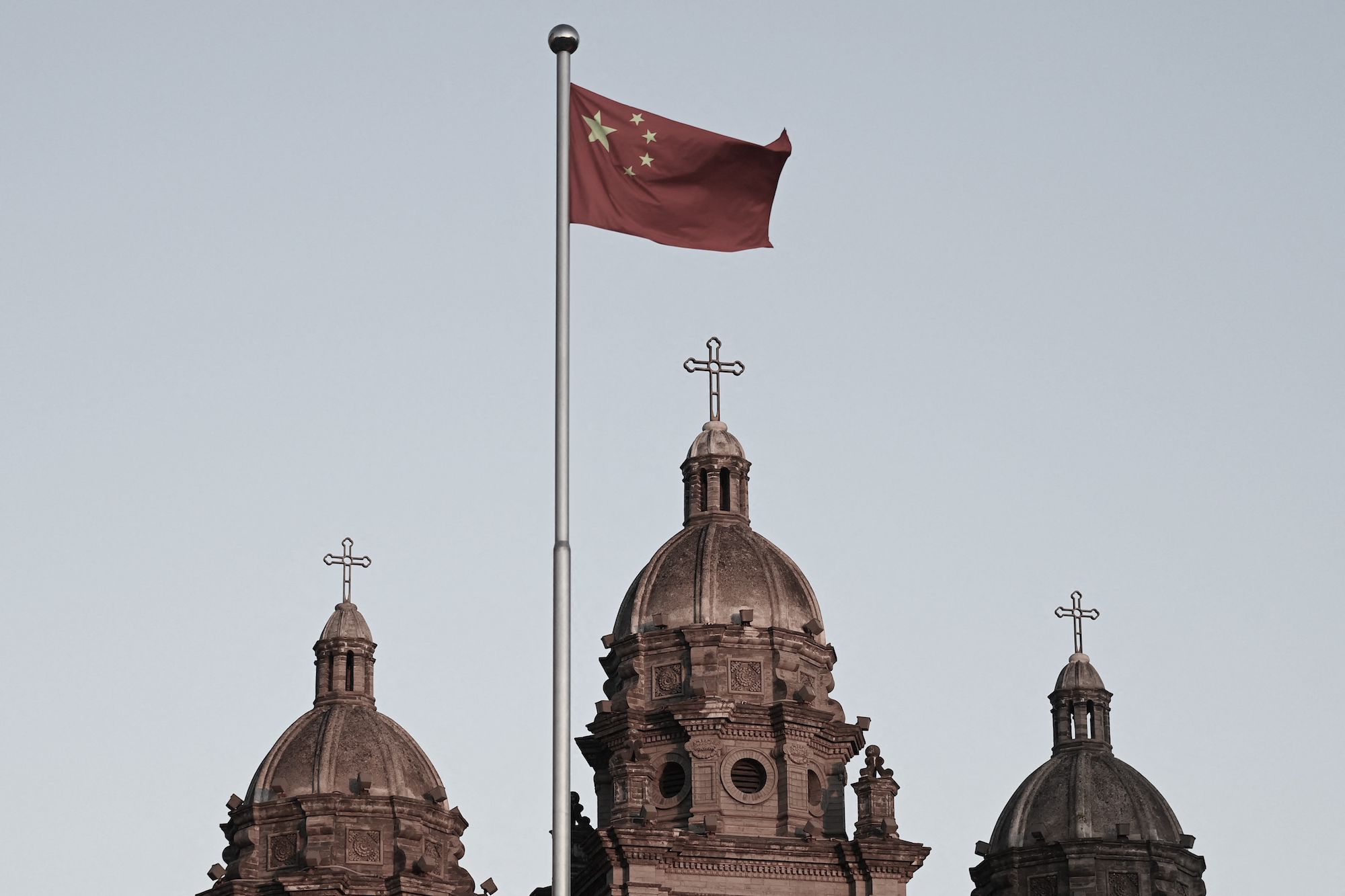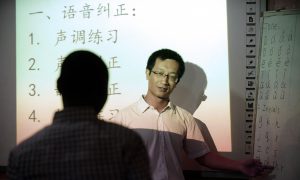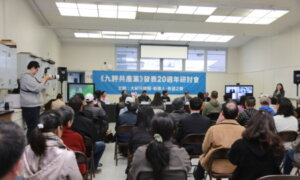According to the Chinese regime’s constitution, its citizens enjoy full religious freedom.
However, policies created by the Chinese Communist Party (CCP) in recent years expose the aim of not only controlling religions but also modifying them to suit the regime’s Marxist principles.
Analysts and former U.S. government officials told The Epoch Times this is being done through a policy called “Sinicization” applied nationwide to religions in China.
“Using the word ‘Sinicization’ is actually a CCP fraud,” Massimo Introvigne, an Italian sociologist of religions, founder of the Center for Studies on New Religions, and editor-in-chief of Bitter Winter, an online magazine that exposes religious persecution in China, told The Epoch Times.
“Historians and missionaries coined the word ‘Sinicization’ to designate the adaptation of the external forms of religion to Chinese culture. The Jesuits started ‘Sinicizing’ Christianity in the 16th century. The word is used by the CCP with an entirely different meaning. For them, ‘Sinicization’ means adapting religion to Marxism and to the CCP ideology.”
A report published in September by the United States Commission on International Religious Freedom (USCIRF) highlighted the issue, describing in detail how the regime has subverted religions through this “coercive religious policy” which has “fundamentally transformed China’s religious environment.”
The USCIRF report details allegations that through Sinicization the party has directly interfered in religious affairs, including ordering the removal of crosses from churches, closing or destroying places of worship, imprisoning and killing practitioners, and even trying to dictate who would be the reincarnation of the next religious leader of Tibetan Buddhism.
Josh Depenbrok, public relations manager for Global Christian Relief—an institute that denounces the persecution of Christians around the world—points out that the regime’s aim with this policy is to increase its control over faith groups.
“The goal of the Sinicization of religions is to make sure that all religious practices, doctrines, and leadership are under the control and influence of the Party.”
The policy implemented by the regime refers mostly to the transformation of the five regions “approved” by the regime—Protestant Christianity, Catholicism, Buddhism, Islam, and Taoism—so that, according to the CCP, they align with “patriotic values.”
At conferences in 2015 and 2016, Chinese leader Xi Jinping emphasized that religions should be guided by Sinicization to “adapt to socialist society.”
Introvigne points out that the aim of Sinicization is not to align religions with Chinese principles but to subvert religions by forcing them to adhere to the regime’s Marxist doctrines.
“The evidence is that there is a campaign called ‘Sinicization of Taoism.’ Taoism is a quintessential Chinese religion. If ‘Sinicization' meant adapting to Chinese culture, the idea that Taoism needs Sinicization would be just ridiculous. Taoism is Chinese culture. But if ‘Sinicization’ for the CCP means making religion totally subservient to Marxism and Xi Jinping’s thought, then even ‘Sinicizing’ Taoism makes sense.”
Historical records show that the persecution of religion has been a constant in the country since the Chinese Communist Party took over leadership in 1949. For experts, Sinicization brings to light a new form of destruction of faith that could be used by the regime to cover up the persecution of believers in the country.
“I think Sinicization is different from other persecution in that it is not an overt effort to end the practice of something called Christianity in China, but rather an effort to co-opt and recreate a pseudo-Christianity that is palatable to and serves the interest of the Chinese Communist Party,” Todd Nettleton, host at The Voice of the Martyrs Radio, an international nonprofit organization that defends the human rights of persecuted Christians, told The Epoch Times.
Nettleton said that this allows the Chinese government to show the world a facade of religious freedom, “while also giving the Party control over what people are taught in churches.”

Chinese worshippers attend a mass during Christmas Eve at a Catholic church in Beijing on Dec. 24, 2018. (Wang Zhao/AFP/Getty Images)
Sinicization Policies
To ensure that the five “approved” religions are aligned with Party regulations, they are each administered by their respective “patriotic religious associations” which are directly controlled by Party officials.“The Chinese government uses a heavy hand when dealing with religious activities. All religious groups must register with the state-approved organizations, like the Three-Self Patriotic Movement for Protestant congregations and the Chinese Patriotic Catholic Association for Catholics, which are then overseen by the United Front Work Department,” said Depenbrok from the Global Christian Relief.
The United Front Work Department (UFWD), which has been one of the main bodies responsible for implementing and supervising Sinicization, is a state agency that reports directly to the Communist Party’s Central Committee and is responsible for managing these religious associations, as well as coordinating nine internal offices, including those dealing with ethnic and religious affairs.
In June, an important seminar on Sinicization—attended by high-level religious affairs leaders—was held in Beijing, where Shi Taifeng, the head of the UFWD and member of the CCP Politburo, stated that the Sinicization of religion “is the only way to actively guide religions to adapt to socialist society.”
The UFWD works with Party officials in different regions and holds meetings with the leaders of patriotic associations to implement new policies linked to the Sinicization of Religions and to ensure that the Party’s regulations are being followed.
In February, a new management policy for venues used for religious activities was implemented, which allows the regime to approve and supervise the opening and management of religious venues, as well as that of their religious leaders, and to ensure that the party’s ideology is integrated into all religious activities and teachings.
Depenbrok said, “There are layers of restriction and oversight to make sure these religious communities align with the CCP’s policies and beliefs.”
Articles 7 and 9 of the regulations for the venue policy states that to open a religious site, the leader of the religious activities must “meet the requirements of the national religious group’s rules and regulations” and must hold a “religious personnel certificate”—which is only granted by the government. This means that places of worship cannot be opened without the presence of a leader who has been approved, trained, and certified by the party.
In addition to control guidelines, these religious policies enforced by the CCP have placed great emphasis on political indoctrination, which under the guise of promoting patriotism, have promoted worship of the party, Chinese leaders, and its “socialism with Chinese characteristics” values.
Article 40 of the new policy stipulates that religious activity sites must establish an educational system for personnel and organize study groups on content such as “the principles and policies of the Communist Party of China [and] Xi Jinping Thought on Socialism with Chinese Characteristics for a New Era.”
“Talking about the regime using an ideological indoctrination in religion, it’s clearly what they’re doing. You have the picture of Xi Jinping in the front of the church, required by the state to do that. Back in that era, you had the picture of Mao up front,” Sam Brownback, former ambassador-at-large of the Office of International Religious Freedom, told The Epoch Times.

Sam Brownback, then-U.S. ambassador-at-large for International Religious Freedom, at the Ministerial to Advance Religious Freedom at the Department of State in Washington on July 16, 2019. (Samira Bouaou/The Epoch Times)
In its report, the USCIRF highlighted that the CCP had ordered images of Jesus Christ and the Virgin Mary to be replaced by pictures of the current Chinese leadership, as well as the display of party slogans in religious places.
“Pastors are often pressured or even required to promote the CCP’s agenda in their sermons and teaching, turning the focus to the loyalty of the party and away from spiritual matters,” said Depenbrok.
He added that the regime’s actions serve as a reminder that the CCP claims supremacy over religions.
“The CCP does this to make sure that religions conform to them. It’s a reminder that in their minds, their authority is higher than Jesus, Mary, or any other religious figure. And it’s part of a broader effort to curb the growth of religious communities, like house churches, which the regime sees as a threat to its power.”
Similar indoctrination guidelines were also highlighted in July this year when the UFWD held a meeting to promote a new campaign called “Strict Governance of Religion.”
During the event, it was said that “strengthening ideological and political guidance for religious leaders and believers is fundamental” and that “support for the religious community must include rigorous educational practices ... reinforcing ideological and political education to cultivate more patriotic and religious talents.”
In October, priests, nuns, and leaders of the Catholic Patriotic Association were led on what is known as the “Red Tour to Express Gratitude to the Party.” The trip included visits to sites that promote the “achievements of the party” and “patriotic” sessions so that the association can “firmly adhere to the direction of the sinicization of Catholicism in our country, listen to the party, feel grateful to the party, follow the party.”
This new policy is also being implemented among Hui Muslims and Tibetan Buddhists.
“Tibetan monks in Tibet have been forcibly raising a flag and singing the Chinese national anthem before they pray in the morning,” Shade Dawa, a researcher at Tibet Watch, a London-based non-profit that monitors human rights in Tibet, told The Epoch Times.

The Chinese national flag flies over a mosque in the old city in Kashgar, Xinjiang Uyghur Autonomous Region, China, on May 4, 2021. (Thomas Peter/Reuters)
Removal of Religious Elements—Echoes From the Past
“The Cultural Revolution in China was an upheaval. It was a revulsion of the direction the country was currently going, and it was deadly. There are, I believe, some similarities between the current situation with religious repression and during the Mao era. During the Cultural Revolution, you had again a time period there, of severe religious oppression,” Ambassador Brownback said, comparing the current religious repression in the country and the period of the Cultural Revolution from 1966 to 1976 led by now-deceased Chinese communist leader Mao Zedong.Others also see parallels between current and past repression by the CCP, in that transforming and destroying cultural heritage is once again policy.
Introvigne from Bitter Winter pointed out that “Sinicization is, first of all, visual. Architectural elements that show religion to passersby or are not ‘Chinese’ are demolished, such as large crosses, mega-statues of Buddha or Guanjin, minarets and domes of mosques.”
Important Islamic symbols in the country have recently been targeted by the regime, such as the Shadian mosque—an important heritage site for Hui Muslims. It was previously demolished during the Cultural Revolution, was later rebuilt, and has now had its architecture remodeled.
Ruslan Yusupov, a postdoctoral fellow at the Society for the Humanities at Cornell University, reported last year that local officials had closed the site for its minarets to be remodeled in a “Chinese” style and its characteristically Islamic dome demolished.
Beyond Religion, a War on All Faith
While major religions are being subverted and forced to toe the party line, faith groups not recognized by the regime are also subject to large-scale persecution.In 2018, the Chinese Communist Party updated its regulations on religious affairs, increasing control over the five “approved” religions and cracking down on unregulated faiths.
“The goal for China’s Communist Party leaders is control, and they view any growing church to be a direct threat to their control,” said Nettleton of The Voice of the Martyrs Radio.
Depenbrok said that unregistered groups are intimidated, persecuted, and watched so that the regime can suppress their religious worship.
So-called “House Christians”—who take this name because they meet in homes or private places—are one such group.
“The CCP routinely considers house churches that do not submit to the Three-Self Patriotic Movement as traitors to the government and labels them as illegal religious organizations,” Depenbrok said.
Nettleton said, “It seems like every single week there are reports of churches being closed down, pastors being arrested, and other persecution of our Chinese Christians.”

Chinese Christians pray during a service at an underground independent Protestant Church in Beijing. China, an officially atheist country, places a number of restrictions on Christians and allows legal practice of the faith only at state-approved churches. (Kevin Frayer/Getty Images)
Todd cited Pastor Wang Yi who is currently in prison, after being sentenced to nine years for leading an unregistered church.
Wang is one of the leaders of the domestic Early Rain Covenant Church, which has been persecuted by the regime since at least 2018 when the church was closed by the Chinese government. Wang was sentenced a year later.
After its closure, members of the church continued to gather in hiding from the regime.
Last year, Bitter Winter reported that police officers went to the home of Xiao Luobiao, deputy deacon of Early Rain Church, trying to prevent him from attending worship and even threatening to arrest him.
The policemen allegedly told Xiao, “Early Rain Church’s Sunday meeting is an illegal meeting, you’re not allowed to go!”
Recently, one of their places of worship in Chengdu, Sichuan province, was raided by the regime during a Sunday service attended by around 60 worshippers. Police surrounded the venue and detained four church leaders.
According to Depenbrok, “The pastor of Guiyang Livingstone Church in Guizhou province was arrested by the Chinese and imprisoned for two years under the guise of ‘divulging state secrets.’ After the pastor was arrested, the Party went after other leaders in the church, including the accountant and elders. Then the church building itself was confiscated by the government.”
The CCP’s persecution also extends to myriad other groups—with the regime targeting one in particular since 1999. In its report, USCIRF highlights the Chinese regime’s efforts to coerce practitioners of Falun Gong, a native Chinese spiritual discipline, to renounce their faith.
“If you look at Chinese government documents for this, it is, ‘transformation.’ And it’s kind of like a cultural revolution Maoist-era term. But essentially what it means is to force people to give up their faith and to pledge their allegiance to the Communist Party,” Sarah Cook, an independent China researcher and author of the China UnderReported newsletter, told The Epoch Times.
Cook added that “from the beginning of the Chinese Communist Party’s persecution of Falun Gong practitioners, that has been a key priority.”
Falun Gong, also known as Falun Dafa, is an ancient Chinese spiritual practice based on the principles of truth, compassion, and tolerance, which began to be disseminated openly to the public in the early 90s.
Because of its moral teachings and health benefits, the discipline spread rapidly throughout the country, and in 1999, official figures from Chinese authorities estimated that between 70 million and 100 million people practiced Falun Gong in China. Fearing the popularity of the practice and its emphasis on independent thinking and morality, on July 20 of that same year, the regime began a brutal persecution against the group.
Reports quickly emerged of kidnappings and unjustified detentions, during which practitioners were subjected to torture, brainwashing, sexual abuse, and other forms of persecution.

Falun Gong practitioners take part in a candlelight vigil in memory of Falun Gong practitioners who passed away during 25 years of ongoing persecution by the Chinese Communist Party in China at the National Mall in Washington on July 11, 2024. (Larry Dye/The Epoch Times)
“So the CCP invests a lot of resources in trying to get Falun Gong practitioners,” Cook said of the regime’s attempts to make practitioners renounce their faith.
“On paper, that doesn’t sound too bad. But in practice, it’s very brutal.”
She described the methods used by the CCP to carry out this “reform.”
“They use a combination of psychological pressure, including trying to recruit family members to pressure Falun Gong practitioners, economic incentives, like depriving people of their pensions if they won’t renounce Falun Gong, and psychiatric abuse.”
In addition to the abuses described, Falun Gong practitioners have been one of the main targets of forced organ harvesting.
In 2019, an independent international tribunal in London, the China Tribunal, ruled that forced organ harvesting was taking place on a substantial scale in China—with the collusion of the Chinese Communist Party—with Falun Gong practitioners as its main sources of organs.
Recently the first known survivor of the Chinese regime’s organ harvesting, Cheng Peiming, who fled China, came to the public to tell his story. Cheng is a Falun Gong practitioner who was condemned for his beliefs, and while in jail, had part of his lung and his liver removed without his consent.

Cheng Peiming, a Falun Gong practitioner who had part of his liver and lung forcibly removed in China, shows his scar after a press conference in Washington on Aug. 9, 2024. (Madalina Vasiliu/The Epoch Times)
Other international bodies, such as the European Parliament, have also exposed this macabre practice in the last few years.
Months ago, the Falun Protection Act, a bill aimed at sanctioning people involved in the forced removal of organs from Falun Gong practitioners in China, was passed by the U.S. House of Representatives. A companion bill has been introduced in the U.S. Senate.
Cook said that the bill’s potential impact is not limited to Falun Gong, as it is linked “more broadly to the issue of organ transplant abuses in China” and aims to sanction those involved in medical misconduct.
“Falun Gong practitioners are a key target of those abuses, but they’re not the only ones. So I think that’s why passing a bill like this, [which] is not just a resolution, it would actually be law. ... It would require the U.S. government to take certain actions. It could be important both for Falun Gong believers in China, but also for other religious believers.”
Using Technology for Persecution
For those who have chosen to profess their faith in a way that is not in line with the regime’s orders, and who have to do so stealthily, the pressure has become even greater as the party advances its technological apparatus for surveillance.According to a report by USCIRF published earlier this year, Chinese authorities are aggressively using technologies such as biometric collection, facial and voice recognition, and artificial intelligence to target spiritual groups such as Christians, Falun Gong practitioners, Uighur Muslims, and Tibetan Buddhists.
In 2019, a Human Rights Watch report pointed out that a cell phone app was being used by the Xinjiang authorities to collect personal information from Uighur Muslims and other Muslim minorities and record activities deemed suspicious in order to identify people considered “problematic,” who could then be investigated and detained in the region’s extensive network of internment camps.
Several Western countries have accused China of using these camps to arbitrarily imprison, torture, and brainwash more than one million Uyghurs.
Nettleton pointed out that a key difference between the religious persecution perpetrated by the regime and that happening elsewhere in the world is the use of advanced technology to monitor the population in detail.
“The scale of budget, technological tools, and manpower make Christian persecution in China different from what Christians are facing in almost all other countries,” he said.
‘Faith Will Survive’
Ambassador Brownback said he believes that despite the regime’s brutal persecution, its attempts to eradicate people’s faith will not succeed.“This is not going to work. As I’ve called it and said many times, this is ... the Chinese Communist Party’s war on faith. It is a war they will not win.”
“I interviewed a Falun Gong man, the only one I’ve ever met, who survived forced organ harvesting. He had joined the Falun Gong movement because it had given him hope and healing from a heart condition that he had. And they beat on him, they did everything possible to him to try to get him to quit his faith. And it just made it deeper in him,” Brownback said.











